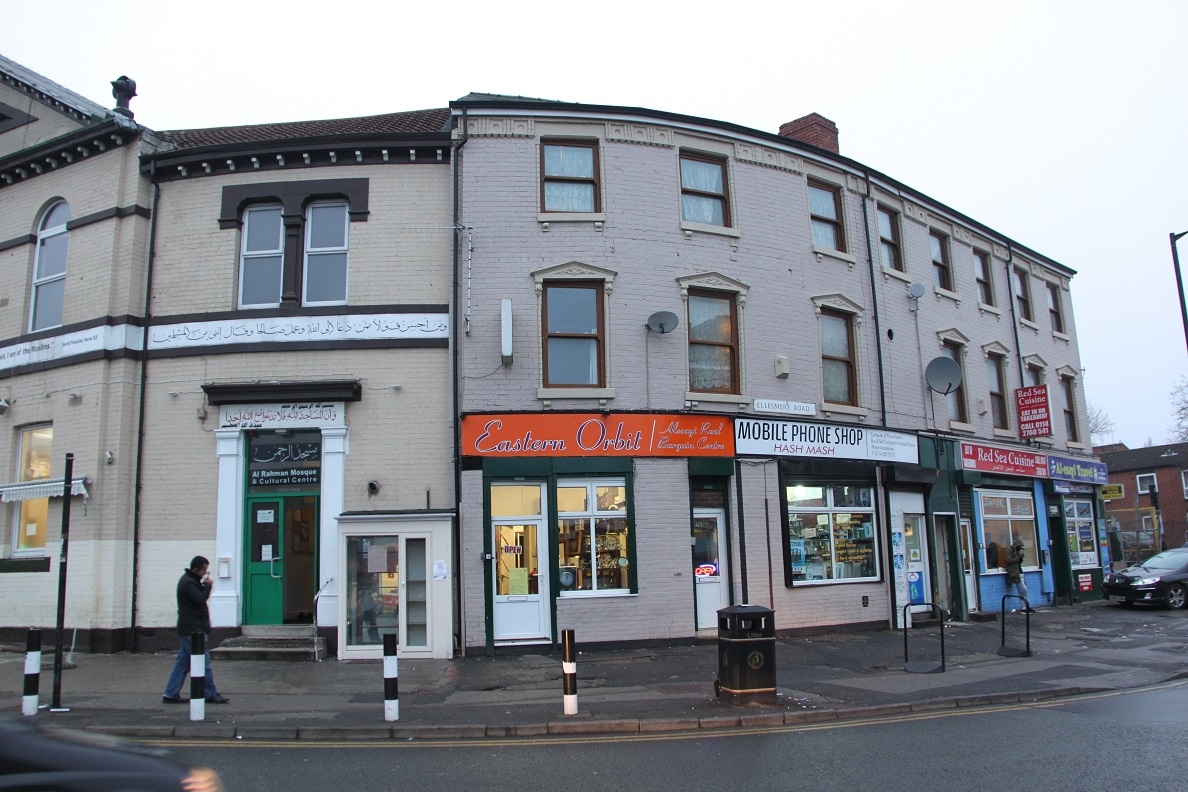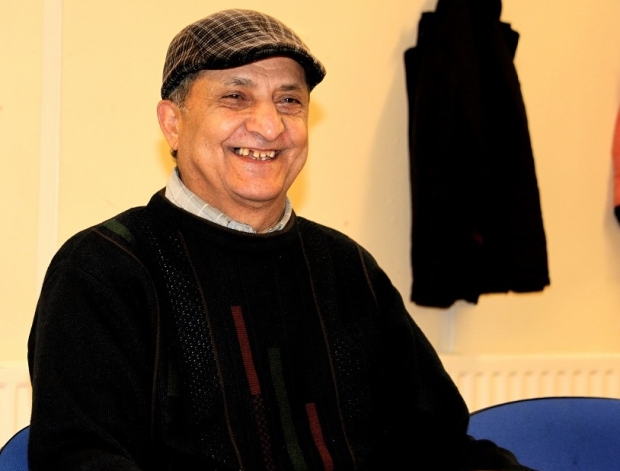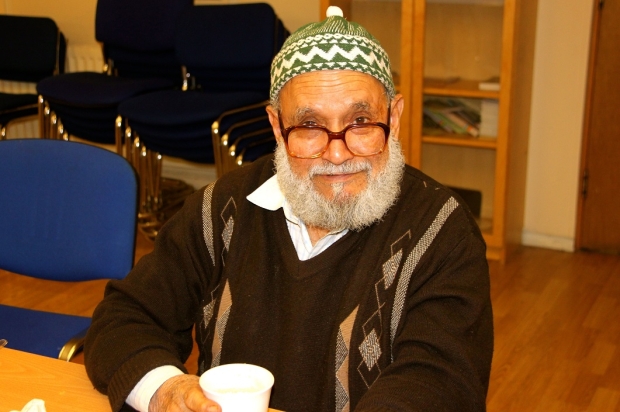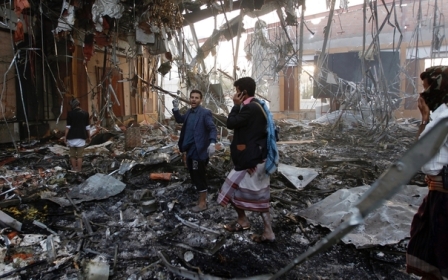Yemenis in Britain: 'The war is like a fence between us'

At a charity fundraiser in Birmingham to raise money for the starvation crisis in Yemen, 84-year-old Saleh Ahmed Muflihi pulled out his camera to show me pictures of his home in Yafaa, northeast of the city of Aden.
The fact that Muflihi misses his home is hardly a surprise. Nestled amidst the tranquillity of the mountains, its elegance typifies modern and traditional Yemeni architecture with stained glass windows and a sitting room called a mafraj at the entrance to welcome people.
In his absence, the house remains closed and cared for by a family friend due to the war that has engulfed the country since March 2015, when Saudi Arabia led a coalition of Arab and Gulf countries in support of Yemen’s government against Shia Houthi rebels.
Despite Aden’s liberation from the Houthis in July 2015, Yemen’s second largest city has become a lawless hotbed for Islamic State (IS) recruits.
“I spent all my life in the UK, but I still love going to my home in Yafaa. Also my wife is undergoing cancer treatment, so I will not leave her,” he said, adding that a visit to Yafaa is unlikely imminent.
“We suffered a lot. If you worked with an English bloke, and he didn't like your work or was fed up, he mistreated people. I was lucky [as] I learned quickly and mastered the work so I could work independently,” recalled Muflihi, who worked at the factory for 23 years.
Journeys by Yemenis in the 50s and 60s at the height of Britain's post-war economic boom were not uncommon. Immigrants poured in from all over the Commonwealth, including Ireland, the Asian subcontinent and the West Indies.
Most people who arrived in Britain from Yemen were country-dwellers fleeing the oppressive Yemeni aristocracy, but also were leaving behind a Yemen that had economically stagnated under British colonialism.
Dire working conditions
Yemenis who arrived in the UK from the countryside were illiterate and had little knowledge of the language or their workplace rights. Some arrived on their own, in search of better economic prospects.
Other Yemenis from the north were encouraged under British colonial rule to take up work in British factories and foundries to make up for the labour shortages.
“The British had sold us a dream, the idea of a better life in Britain, and we believed it. When we arrived in England, it was very different.” Ali arrived in the UK in August 1960 to work in the rolling mill factories in Sheffield.
'The British had sold us a dream, the idea of a better life in Britain, and we believed it. When we arrived in England, it was very different'
“I shared a room, it was so terrible, no toilet, no fire, not enough water, it was cold,” Ali added.
Muflihi recalled long working nights in the cold, without heating. “Five of us shared a place in Nedge hills. The bathrooms were a problem as they were shared by the Irish, Asians, Jamaicans and every other nationality.”
Of Sheffield in the fifties, Ali opined, there was no town, only factories.“The sky was full of black smoke day and night, very different from what it is today.”
From dawn until dusk, Yemenis toiled in factories, coal-ship burning rooms, battling smoke, rust, burnt metals and deafening industrial noises exceeding 40 decibels, often without seeing sunrise or sunset. The work was physically demanding and the wages were low. Safety gear and procedures were non-existent.
A significant majority sustained injuries, lost their fingers, or suffered from deafness, asthma, and skin allergies. But often these went unreported as the victims had minimal English skills and were clueless about their human rights.
In a journal titled Drinking From One Pot, which was published in 1991, Dr Abdulgalil Shaif, who led the Yemeni Community Organisation in Sheffield for 12 years, said the consequences of the dire working conditions among many Yemenis can be felt even today.
“Industrial deafness is in 90 percent of working-class Yemenis, and 30 percent suffer from asthma,” said Shaif, adding that there’s hardly one former steelworker who has not had an accident at work.
Nasr al-Yefai shows me his amputated thumb from an accident while working in the Sheffield cutlery.
”We melted raw steel to produce final products,” Yefai said, and added that at least two people died on the job. Still scarred from the experience, he refused to elaborate further and put it down to persistent exposure to chemicals, heat, unsafe gear and a lack of safety procedures. Yefai received no insurance.
In 1982, after the closure of the steel mills, Yefai left Britain and found work in Saudi Arabia as a jeweller. He returned a few years later to his family business in Sheffield, as his family now owns many shops including a travel agency and a mobile phone shop.
After comparing the working conditions to Saudi Arabia, he said: “The British are angels compared to the Arab world. Here we have healthcare and pension. Sheffield is home.”
Muflihi rose to a supervisory level after 23 years at the factory and admits his gamble of coming to England paid off. He married an English wife and raised five children who now live in England, Yemen and Kuwait.
'The war is like a fence between us'
Similarly, Saleh al-Nud, a trained criminal lawyer in his early forties with cousins in Aden, recognises the only thing that separates their worlds is his father’s choice to leave Yemen and go to Britain.
“Those early days weren't easy for my dad, but if it weren’t for him we wouldn't be here. I see my cousins back home, and it’s difficult," he said.
Since the start of the Saudi coalition bombing campaign in March 2015, more than 3.11 million people have been internally displaced and 14.12 million people are food insecure, according to the United Nations.
Muflihi and Ali, married to English wives, told MEE intermarriage between Yemenis and English people were not uncommon. While some Yemenis married English wives, others had wives at home. Poor wages, a lack of stable accommodation and work uncertainty stifled their chances of bringing their families to England.
Separations for years and decades meant fathers missed out on their children’s early and adolescent years, and wives seeing their husbands for a total of 10 months in a decade. Some struggle even today, sandwiched between UK immigration bureaucracies and the ongoing civil war.
“The war is like a fence between us, we are unable to do anything. I just wish to be with my family now, Muharram said.
The rumbles of war are hard to escape. Death and devastation are ubiquitous. Airports are closed, flights run sporadically and the ticket prices are exorbitant.
“Ever since I arrived in 1959, I would return every four years, but this year I have not been able to. I don't know when I will visit.”
'They are making the decisions not us'
Many Yemenis in the UK denounce Britain's support of the Saudi-led coalition in Yemen, but their anger towards Arab countries involved in the war is much more fierce.
"Saudi has too much money from oil, instead of helping Yemen, they are bombing us," Muflihi said. "They just want to occupy us,”
Saudi Arabia has been accused by international rights groups of killing hundreds of civilians and purposefully targeting civilian infrastructure in its war against the Houthi rebels in Yemen, which has left more than 10,000 people dead and 40,000 injured since the war started, according to the United Nations.
Riyadh has rejected all accusations, saying that internal investigations may have uncovered mistakes but that they do not amount to significant breaches of international humanitarian law.
"They [Western powers] are making the decisions, not us," he said.
The UK has sold billions of dollars of armaments to the Saudis since it entered the Yemen war. In October, British MPs overwhelmingly rejected a call for the government to withdraw its support for the Saudi-led coalition in Yemen.
Abtisam Mohamed, chief executive of Aspiring Communities Together (ACT) and local councillor in Sheffield, said that more Yemenis need to speak out in order to put pressure on the British government. Through her charity work, she is urging young disenfranchised Yemenis to get involved.
Others who are against the Houthi rebels, welcome the UK’s support, which they say is necessary for Saudi to fight against the Houthis and "liberate" Yemen.
Abdul Basit Nadir, councillor for Liverpool City Council since 2011, said that the situation in Yemen is complicated, and many Yemenis are split on which side they support.
"Weapons have always been sold by the West, by the US, UK and Europe," Nadir added.
There is a lack of pressure on politicians and policymakers. “We only have two people involved in the political system,” she added, referring to Qadir and herself.
The inherent invisibility has led to many elderly Yemenis feeling marginalised. Mohamed, who often hears concerns of elderly pensioners, said a Yemeni once lamented about his pension cuts, and accused the government of disregarding the contribution of his services to the British Merchant Navy during the second world war.
“I have been here since the 1930s, and here I am fighting for my state pension that we are entitled to,” the old pensioner told Mohamed.
During the first and second world wars, Britain hugely depended on foreign seamen, as seen in Fred Halliday’s Arabs in Exile. A 1942 register of foreign seamen revealed 30 percent were Arabs. There is no specific number for Yemenis, but it is estimated 1,500 were from Yemen and another 1,000 were from Somalia.
In 2010, Chancellor George Osborne unveiled the biggest spending cuts since the late 1970s, which severely impacted the elderly pensioners, struggling families in low-paying jobs, and the disabled.
Hopes for Yemen’s future
A significant portion of Yemenis who settled in Britain, to this day, struggle with the choices of identity, home and belonging.
For many, their hearts are in Yemen. They are often torn between a country which they were born into, filled with childhood nostalgia and familiarity of tribes, people and language, and another that defines the latter part of their lives with law, order, healthcare, education and the possibility of advancement.
When people like Saeed Ali came to England, they dreamed of returning to a happy Yemen or Arabia felix" as it was once known. A hope that one day they will retire to their lands and live in the homes built from the sweat and blood in grisly foundries. But that was not to be.
“Life in Yemen is very dangerous now," Ali said. "For us who have lived here for 56 years it will be difficult. When you retire, you need to have some peace, but there is no peace [in Yemen].”
'Why would I choose to live in the snow, rain and grey cloudy skies? My brothers and sisters are in Aden, they want to be with me'
With every passing day, his hopes of returning to Aden are waning.
“We don't know about the future. This war is not only in Yemen, we’ve got Libya, Iraq, Syria and other Middle Eastern countries. I fear future generations will be deprived of experiencing Yemen’s heritage,” he concedes.
New MEE newsletter: Jerusalem Dispatch
Sign up to get the latest insights and analysis on Israel-Palestine, alongside Turkey Unpacked and other MEE newsletters
Middle East Eye delivers independent and unrivalled coverage and analysis of the Middle East, North Africa and beyond. To learn more about republishing this content and the associated fees, please fill out this form. More about MEE can be found here.








